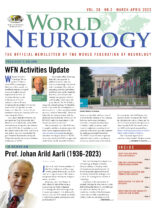The WFN, global regions, and the World Federation of Neurorehabilitation
By Tissa Wijeratne, David W. Dodick, Steven L. Lewis, and Wolfgang Grisold
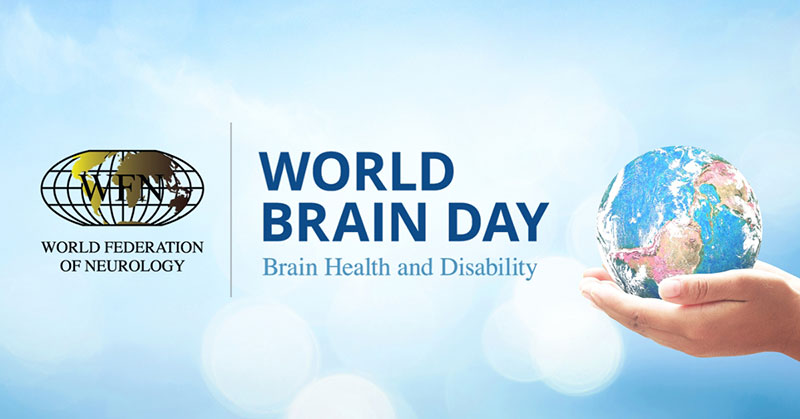 World Brain Day 2023 annually commemorates the foundation of the World Federation of Neurology (WFN) on July 22. The previous World Brain Day themes focused on specific neurological diseases such as Parkinson’s disease, migraine, epilepsy, multiple sclerosis, and many others. We are again partnering with all six regions of the WFN as well as the World Federation for NeuroRehabilitation (WFNR) to unite the world on the disability that results when brain health compromised.
World Brain Day 2023 annually commemorates the foundation of the World Federation of Neurology (WFN) on July 22. The previous World Brain Day themes focused on specific neurological diseases such as Parkinson’s disease, migraine, epilepsy, multiple sclerosis, and many others. We are again partnering with all six regions of the WFN as well as the World Federation for NeuroRehabilitation (WFNR) to unite the world on the disability that results when brain health compromised.
Brain disorders, affecting more than one billion people, are the leading cause of disability-adjusted life years (DALYs). Optimizing brain health, care, and rehabilitation for those with disability from neurological disease is a global priority, requires involvement of policy makers, health care providers, foundations, public health authorities, professional societies, patient advocacy organizations, and the private sector.
The World Health Organization (WHO) identified the following determinants for brain health:
- Physical health
- Healthy environments
- Safety and security
- Learning and social connections
- Access to quality services
By addressing these determinants, we can optimize brain health, prevent neurological disease, facilitate early and rapid diagnosis, ensure universal access to care, and thus lower the prevalence and disability associated with most neurological diseases. For those with progressive, late-stage, and incurable disease, access to palliative care to ensure human dignity at the end of life is an imperative.
The Intersectoral Global Action Plan on Epilepsy and Other Neurological Disorders 2022–2031 (IGAP) was initiated by WHO and unanimously adopted at the World Health Assembly on May 27, 2022. [https://apps.who.int/gb/ebwha/pdf_files/WHA75/A75_10Add4-en.pdf].
The IGAP provides a comprehensive response to the burden of neurological disorders; the global action plan suggests actions to Member States and national and international partners to close the treatment gap for people with neurological disorders and support quality management of these conditions.
Since the IGAP is also directed to organizations such as the WFN, this is an excellent opportunity to strengthen the collaboration between the WFN and WHO by linking our actions with the principles of the IGAP.
In this year’s World Brain Day | Brain Health and Disability: Leave No One Behind, we intend to highlight five key messages.
Prevention: Brain disabilities can be prevented, treated, and rehabilitated.
Awareness: Global brain health awareness can reduce the burden of brain disorders.
Access: Universal access to care, treatment, rehabilitation, and assistive technology is essential.
Education: Education increases equity for those living with brain disabilities.
Advocacy: Brain health is a human right that applies to everyone, everywhere.
As in the previous World Brain Days, a special logo and material have been produced and will be made widely available for local/regional use by health care professionals, regional and national societies, and all other stakeholders involved in neurological disease advocacy. Before World Brain Day, a template for press mailings will be distributed to help the local organizations. On World Brain Day, a webinar will be launched and, with invited participants from the press, key messaging on brain health and disability will be disseminated.
The ultimate success of World Brain Day depends on your local activities. Please make World Brain Day your own, use all the material we provide, and ask for more if needed. Experience has shown that this international day has created considerable press attention, but local activities and information make the difference.
Please involve patients, caregivers, the public, local, regional, and national policy makers, and patient groups that might be interested in this topic. Please be sure to post your activities on social media to help raise awareness. Join us on World Brain Day as we ensure no one is left behind.
Brain health care faces many global inequalities. Let’s change this together. Let’s leave no one behind.
We eagerly await your reports of your local plans on World Brain Day events so that we can publish them in World Neurology.
Learn more at www.wfneurology.org. •
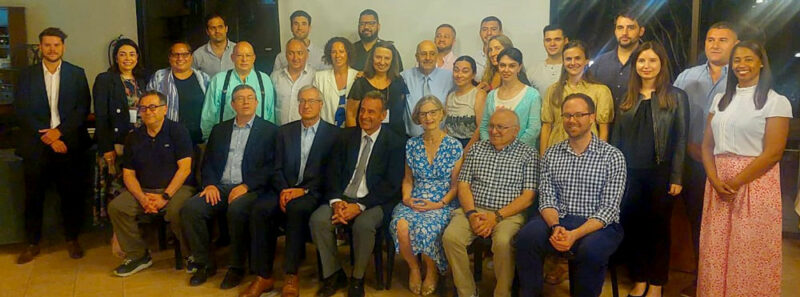
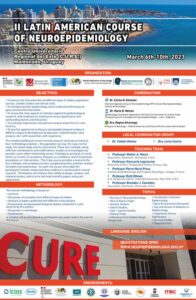 The I Latin American Course of Neuroepidemiology took place in Panama City, Panama, in April 2018. This II course was initially planned to take place in March 2020. Unfortunately, the COVID pandemic forced the organizers to postpone it until 2023. The structure and the content of these Latin American courses are based on the experience of the Erice’s International Course of Neuroepidemiology. (See World Neurology, posted Feb. 24, 2023. Report on the Ninth International Course of Neuroepidemiology: Methods and Clinical Applications worldneurologyonline.com).
The I Latin American Course of Neuroepidemiology took place in Panama City, Panama, in April 2018. This II course was initially planned to take place in March 2020. Unfortunately, the COVID pandemic forced the organizers to postpone it until 2023. The structure and the content of these Latin American courses are based on the experience of the Erice’s International Course of Neuroepidemiology. (See World Neurology, posted Feb. 24, 2023. Report on the Ninth International Course of Neuroepidemiology: Methods and Clinical Applications worldneurologyonline.com).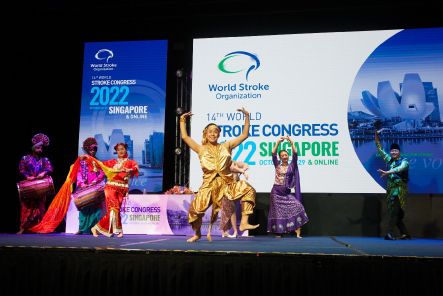 The World Stroke Congress (WSC) is the flagship meeting of the World Stroke Organization (WSO). After the exclusively virtual events in 2021 and in 2020 (joint conference with the European Stroke Organization), the WSC 2022 in Singapore was the first international large-scale in-person meeting. With more than 4,400 attendees (approximately half in person and half online) this was the largest WSC ever. It served as an excellent opportunity to discuss latest clinical and research results with colleagues from all over the world. The participants were from 106 countries with highest attendance from colleagues from Australia, China, India, Indonesia, Malaysia, Philippines, Singapore, United Kingdom and the United States. The faculty of 204 invited speakers were well balanced across continents (Asia 34%, South and North America 24%, Europe 25%, Australia and Africa 18 %).
The World Stroke Congress (WSC) is the flagship meeting of the World Stroke Organization (WSO). After the exclusively virtual events in 2021 and in 2020 (joint conference with the European Stroke Organization), the WSC 2022 in Singapore was the first international large-scale in-person meeting. With more than 4,400 attendees (approximately half in person and half online) this was the largest WSC ever. It served as an excellent opportunity to discuss latest clinical and research results with colleagues from all over the world. The participants were from 106 countries with highest attendance from colleagues from Australia, China, India, Indonesia, Malaysia, Philippines, Singapore, United Kingdom and the United States. The faculty of 204 invited speakers were well balanced across continents (Asia 34%, South and North America 24%, Europe 25%, Australia and Africa 18 %).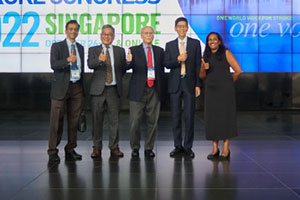 Pacific Stroke Organization, Association of Southeast Asian Nations Neurological Association, and WHO South-East Asia Regional Office. Stroke support organizations substantially contributed to the WSC 2022, integrated into the main program and also in parallel independent sessions. During the coffee breaks, there was dialogues on non-communicable diseases (NCD).
Pacific Stroke Organization, Association of Southeast Asian Nations Neurological Association, and WHO South-East Asia Regional Office. Stroke support organizations substantially contributed to the WSC 2022, integrated into the main program and also in parallel independent sessions. During the coffee breaks, there was dialogues on non-communicable diseases (NCD).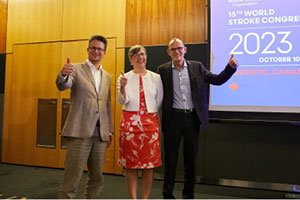 Patients with indications of endovascular stroke therapy according to DAWN or DEFUSE-3 criteria were also not considered. Other highlights were the meta-analysis of six trials comparing endovascular stroke therapy alone against bridging (combined with intravenous thrombolysis). In this meta-analysis including 2314 patients, endovascular stroke therapy could not prove to be non-inferior to bridging therapy and this is also valid for multiple subgroups. The first phase 3 trial on stem cells in stroke recovery (TREASURE) was negative, a lowering of systolic blood pressure under 120 in successful endovascular stroke therapy has negative impact on the patients’ outcome (ENCHANTED2), and treatment by tenecteplase was non-inferior to alteplase treatment (AcT Study).
Patients with indications of endovascular stroke therapy according to DAWN or DEFUSE-3 criteria were also not considered. Other highlights were the meta-analysis of six trials comparing endovascular stroke therapy alone against bridging (combined with intravenous thrombolysis). In this meta-analysis including 2314 patients, endovascular stroke therapy could not prove to be non-inferior to bridging therapy and this is also valid for multiple subgroups. The first phase 3 trial on stem cells in stroke recovery (TREASURE) was negative, a lowering of systolic blood pressure under 120 in successful endovascular stroke therapy has negative impact on the patients’ outcome (ENCHANTED2), and treatment by tenecteplase was non-inferior to alteplase treatment (AcT Study).